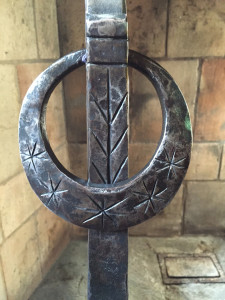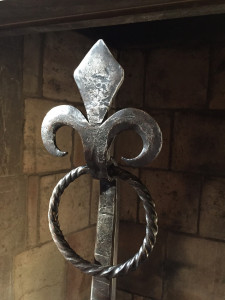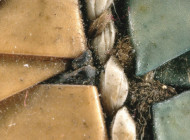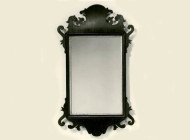
PHILADELPHIA, PENN. — Leeds Art Foundation has discovered and acquired two pairs of wrought iron andirons made by Samuel Yellin Metalworkers of Philadelphia, for the Director’s Conference Room and Officer’s Dining Room of the headquarters of the Westinghouse Air Brake Company in Wilmerding, Penn., east of Pittsburgh.
Samuel Yellin (1884– 1940) began creating ironwork — hardware, lamps and andirons — for an addition to the Westinghouse Air Brake Company General Office Building in Wilmerding in 1927. The major addition, designed in the French Renaissance style by architects Janssen and Cocken of Pittsburgh, was appended to the original building designed by Frederick J. Osterling in the 1890s. The company was founded in 1869 by George Westinghouse, the inventor of the air brake, who later established Westinghouse Electric Company.
The hardware and lighting for the commission was generally quite restrained, but the fireplace equipment was exceptional throughout. For example, the andirons for a Mr Rowan’s office featured ribbon-like scrolls and complex geometric patterns incised into flattened iron bars. Andirons rendered for the Directors’ Conference Room were of special note, with ribbon scrollwork, incised geometric patterning and large fleur-de-lis finials. The Officer’s Dining Room was set with andirons arising from bowed legs with fleur-de-lis undercarriages, incised-pattern shafts with decorated rings and thick-gauged four-arm torchiere candle holders for use when a fire was not burning. Mr Down’s office and Mr Humphrey’s office each received andiron sets of excellent design, with elaborate scroll, leaf and geometric-pattern decoration and large animal-head finials holding decorated rings of iron.
Joseph Cunningham, director of the Leeds Art Foundation, noted, “These two pairs of andirons are excellent representations of Samuel Yellin’s mid-1920s ironwork, featuring massive construction, confident and unusual designs and superbly detailed ornamentation. It is extremely rare to find such objects in excellent original condition with complete documentation and provenance directly to the historic building for which they were made.”
Dr Cunningham and Leeds Art Foundation are working on a comprehensive study of Yellin’s work, which publication is expected within a few years.





